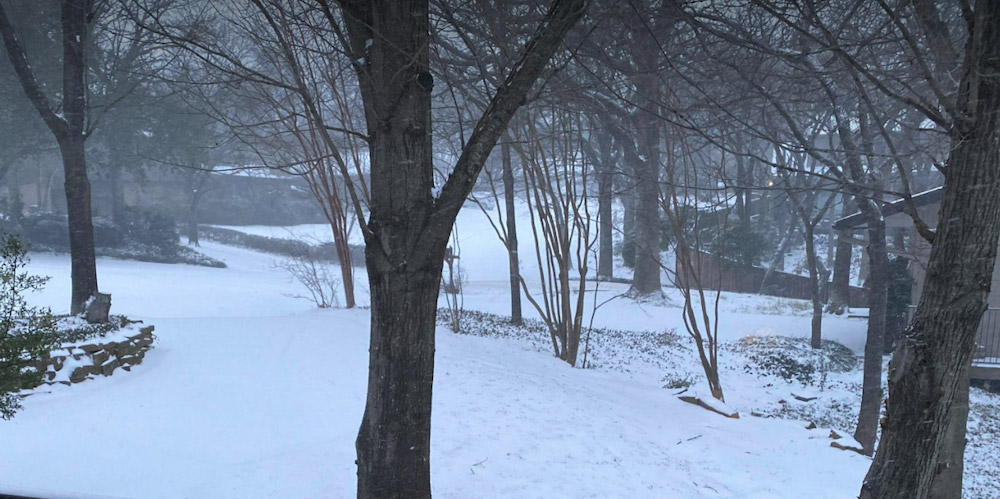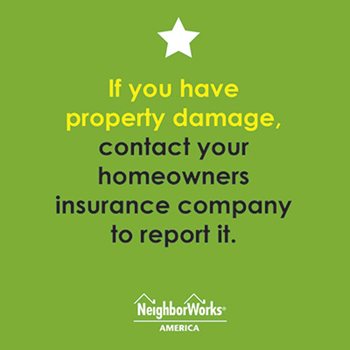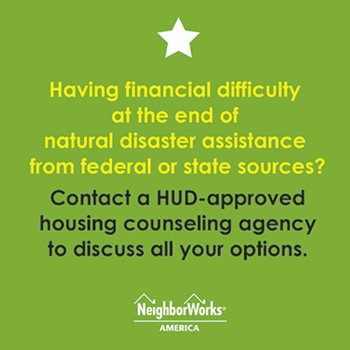In the wake of the historic winter storms that have left large portions of the country blanketed

Snow covers a yard in Arlington, Texas. Photo/Andy Keller
in extreme cold, snow, ice and high winds, millions of Americans are now faced with the daunting challenge to meet their basic needs—to find adequate warm shelter, medical care and additional assistance. In particular, Texas has been hit especially hard. A state of emergency has been declared and the Federal Management Agency (FEMA) has begun setting up emergency relief efforts across the south. Power has started to come on for hundreds of thousands, but millions still face inadequate access to water and heat. As the ice thaws and snow melts, it’s also time to assess home damages and protect your financial assets.
Beware of Scams During this critical time, home owners and renters alike are urged to remain vigilant and do what they can to protect themselves from scams that seek to exploit the situation, take advantage of your vulnerability, and steal your money or personal information. Finding shelter and access to water continue to be a necessity, and the Federal Emergency Management Agency (FEMA) has warned of scam activity in Texas.
During this critical time, home owners and renters alike are urged to remain vigilant and do what they can to protect themselves from scams that seek to exploit the situation, take advantage of your vulnerability, and steal your money or personal information. Finding shelter and access to water continue to be a necessity, and the Federal Emergency Management Agency (FEMA) has warned of scam activity in Texas.
Families and individuals seeking assistance should only use verified sources like FEMA, state emergency aid organizations and the American Red Cross. There are phone numbers and resources that appear to be legitimate, circulating on social media and websites that are only setup to steal personal information. The number offers access to a hotel and power, and once residents call the number, they’re asked to provide personal information such as social security number, income, insurance information and address.
"This is a scam," FEMA says. The best information on legitimate assistance will come from local official and the Texas Division of Emergency Management.
Safeguarding from Scams
The bad actors are always out there. COVID-19 brought about an uptick in activity related to foreclosure and mortgage assistance. To help consumers educate themselves and protect their homes,
foreclosure and mortgage assistance. To help consumers educate themselves and protect their homes,
NeighborWorks America launched a national public education initiative, Stop Home Scams, to alert and empower families and individuals to keep their homes, access trusted assistance and report illegal activity to the proper authorities. The information on STOPHOMESCAMS.org includes helpful information on disaster relief and recovery, as well as other scenarios.
Resources for Help
If you, or someone you know, is in need of assistance, resources are available. If you have property damage, contact your homeowners insurance company to report it. According to the American Property Casualty Insurance Association (APCIA), winter storms cause an average of $1.5 billion in property damage each year. Harsh weather, burst pipes, falling tree limbs, roof or deck collapses, as well as wet, icy roads can all result in insurance claims. In the event you are having financial difficulty at the end of the natural disaster assistance from federal or state sources, contact a HUD-approved housing counseling agency to discuss all of your options.
In the event you are having financial difficulty at the end of the natural disaster assistance from federal or state sources, contact a HUD-approved housing counseling agency to discuss all of your options.
In addition, financial institutions may offer programs to assist in recovery efforts. For example, Wells Fargo offers Disaster Assistance and Property Damage Support.
At NeighborWorks America, our network organizations have been through disasters before with the communities we live in and serve, and we are inspired by the resiliency and sense of hope we see when tragedy strikes. We know that neighbors can and will come together to support each other, working to rebuild and recover as a community.

